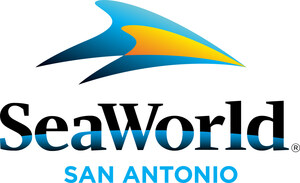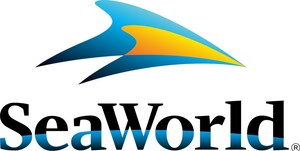SAN DIEGO, Dec. 17, 2020 /PRNewswire/ -- Following SeaWorld's 2019 publication of a foundational study that created first-ever standards for assessing the health of killer whales, this same team of veterinarians from SeaWorld, the Pacific Marine Mammal Center, and the University of Florida College of Veterinary Medicine has published a similar study about dolphin health in Veterinary Quarterly. Using data from 1,426 blood samples collected as part of SeaWorld's routine preventative medicine program from 156 healthy bottlenose dolphins at SeaWorld Orlando, San Antonio, and San Diego parks, experts were able to define health benchmarks that can be used by other veterinarians and conservation biologists to help improve the diagnosis of health, disease, and stressors of wild dolphin populations.
Bottlenose dolphins in the United States are protected under the Marine Mammal Protection Act because they are vulnerable to many threats. These can include disease, biotoxin, pollution, habitat alteration, interactions with commercial and recreational fishing, energy exploration and oil spills, and other types of human disturbance (such as underwater noise).
"It is very difficult to assess the health of a wildlife species, to in turn be able to help them, because they are typically very challenging to access and their individual histories are largely unknown," said Dr. Hendrik Nollens, Pacific Marine Mammal Center's Vice President of Conservation Medicine and Science and study lead author. "Our study not only reports on what normal looks like in a large population of healthy dolphins with a known medical history, but we also compare what normal looks like across several populations of dolphins, both in human care and in the wild. SeaWorld has uniquely equipped, on-site veterinary diagnostic laboratories that generate high quality health data that can be shared with the scientific community."
Similar to the earlier report on standards for assessing health in killer whales, the ability to collect blood-based health data of dolphins in a reliable, controlled manner provides a unique opportunity for scientists to understand the species' physiology. The results of managed population studies are also very valuable because veterinarians can conduct longer-term follow-up of those same dolphins to track their known age, health, reproductive and nutritional statuses. Not only are dolphins able to participate in such studies as part of their routine preventative medical care at SeaWorld, they are trained to participate in their health care such as presenting the underside of their tail – or fluke – so a veterinary professional can draw a blood sample.
"We had the opportunity to work closely with one of our former undergraduate students on this research study," said Dr. Nicole Stacy, Clinical Assistant Professor of Aquatic, Amphibian and Reptile Pathology, College of Veterinary Medicine, University of Florida. "The dataset was very unique given the number of animals in the study and their broad age range, which in turn provides many applications for the results to benefit cetacean research and conservation."
"Similar to how your primary care doctor checks your weight, blood pressure and overall health and compares the results against a benchmark for human health, this research provides the same benefit to the dolphin population," said Dr. Todd Robeck, SeaWorld Vice President of Conservation Research and study author. "We need to find ways to take better care of the animals in our oceans through research, rescue, animal care and conservation efforts, and my research partners and I are happy to share the results of this study with other scientists and animal welfare experts around the world to help do this."
About SeaWorld Entertainment, Inc.
SeaWorld Entertainment, Inc. (NYSE: SEAS) is a leading theme park and entertainment company providing experiences that matter, and inspiring guests to protect animals and the wild wonders of our world. The Company is one of the world's foremost zoological organizations and a global leader in animal welfare, training, husbandry and veterinary care. The Company collectively cares for one of the largest zoological collections in the world and has helped lead advances in the care of animals. The Company also rescues and rehabilitates marine and terrestrial animals that are ill, injured, orphaned or abandoned, with the goal of returning them to the wild. The SeaWorld® rescue team has helped more than 36,000 animals in need over the Company's history. SeaWorld Entertainment, Inc. owns or licenses a portfolio of recognized brands including SeaWorld®, Busch Gardens®, Aquatica®, Sesame Place® and Sea Rescue®. Over its more than 60-year history, the Company has built a diversified portfolio of 12 destination and regional theme parks that are grouped in key markets across the United States, many of which showcase its one-of-a-kind zoological collection. The Company's theme parks feature a diverse array of rides, shows and other attractions with broad demographic appeal which deliver memorable experiences and a strong value proposition for its guests.
Copies of this and other news releases as well as additional information about SeaWorld Entertainment, Inc. can be obtained online at www.seaworldentertainment.com. Shareholders and prospective investors can also register to automatically receive the Company's press releases, SEC filings and other notices by e-mail by registering at that website.
About Pacific Marine Mammal Center
The Pacific Marine Mammal Center rescues, rehabilitates and releases marine mammals and inspires ocean stewardship through research, education and collaboration. PMMC is a non-profit 501 (c)(3) organization. Our Tax-ID number is: 95-3680896
20612 Laguna Canyon Road | Laguna Beach, California, 92651 | (949) 494-3050
About the University of Florida College of Veterinary Medicine
The University of Florida College of Veterinary Medicine, the state's only veterinary college, is supported through funding from UF Health and the UF Institute of Food of Agricultural Sciences, (UF-IFAS). The college's Aquatic Animal Health program focuses on the health of marine mammals and other aquatic species and is funded in part by the Florida Fish and Wildlife Conservation Commission.
Contact: Stephen Schuler, [email protected]
SOURCE SeaWorld Parks & Entertainment

WANT YOUR COMPANY'S NEWS FEATURED ON PRNEWSWIRE.COM?
Newsrooms &
Influencers
Digital Media
Outlets
Journalists
Opted In






Share this article